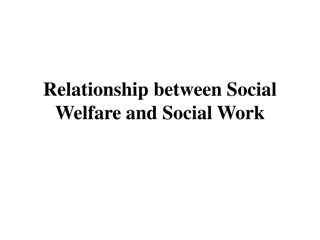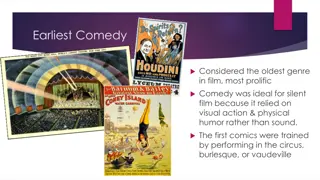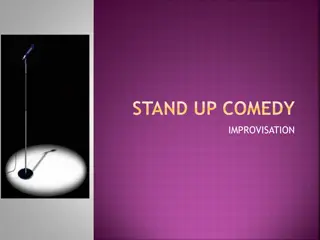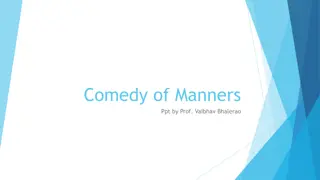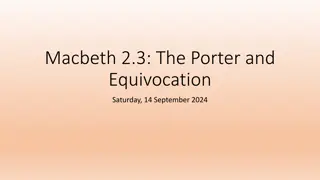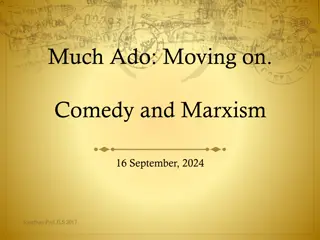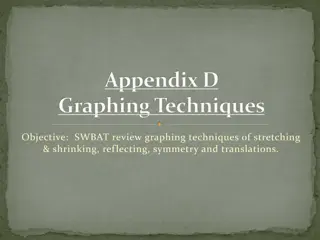Comedy Techniques, Social Function, and The Great Chain of Being
Explore the world of comedy, from slapstick and farce to parody and satire. Learn about techniques like dramatic irony and gallows humor that add depth to comedic genres. Discover how the Great Chain of Being shaped Elizabethan beliefs about social order and divine right. From God and angels to trees and rocks, the hierarchy of beings unfolds in a humorous yet thought-provoking manner.
Download Presentation

Please find below an Image/Link to download the presentation.
The content on the website is provided AS IS for your information and personal use only. It may not be sold, licensed, or shared on other websites without obtaining consent from the author. Download presentation by click this link. If you encounter any issues during the download, it is possible that the publisher has removed the file from their server.
E N D
Presentation Transcript
COMEDY TECHNIQUES, SOCIAL FUNCTION, AND THE GREAT CHAIN OF BEING
TYPES OF COMEDY (OFTEN COMBINED) Slapstick: Slapstick humor is a boisterous form of comedy with chases, collisions and practical jokes where people just do silly things such as tripping, falling over or embarrassing themselves just to make people laugh. Farce: A comedy characterized by broad satire and improbable situations is termed as farce. A farce is a comedy style, which aims to entertain the audience by means of unlikely, improbable and extravagant situations, disguise and mistaken identity, verbal humor of varying degrees of sophistication. It can include sexual innuendo and word play, or a fast-paced plot whose speed usually increases, culminating in an ending that often involves an elaborate chase scene. Farce is also characterized by physical humor and the use of deliberate absurdity or nonsense. Parody: A parody is a work created to mock, comment on, or poke fun at an original work, its subject, or author, by means of humorous or satiric imitation. This imitation may exaggerate or misrepresent somebody's style in a humorous way.
TECHNIQUES THAT COULD APPEAR IN MANY COMEDY GENRES Dramatic Irony: Dramatic irony is the incongruity between what the audience knows and what the character(s) knows. Audience members know that Oedipus is Jocasta s son, so they are tormented with the irony when he marries her, fulfilling the prophesy his parents worked so hard to escape. When we watch Twelfth Night, we know that Cesario is Viola, so when Olivia woos her, the audience is tormented and titillated. Satire: Satire is a branch of comedy, which makes use of witty language to convey insults or scorn. In satire, human or individual vices, follies, abuses, or shortcomings are held up to reprimand by means of ridicule, burlesque, derision, irony, or other methods. Although satire is usually meant to be funny, the purpose of satire is not primarily humor, but an attack on something or some subject the author strongly disapproves of. Gallows Humor: Gallows humor is a type of humor which arises from traumatic or life-threatening situations such as wartime events, mass murder, hostilities or in other situations where death is impending and unavoidable. This genre is similar to black comedy but, the only difference is that the comedy is created by the victim. There are others, but that s a good start.
PLACES, EVERYONE! Elizabethans believed that God set out an order for everything in the universe. This was known as the Great Chain of Being. On Earth, God created a social order for everybody and chose where you belonged.
FROM GOD AND ANGELS TO TREES AND ROCKS The Great Chain of Being includes everything from God and the angels at the top, to humans, to animals, to plants, to rocks and minerals at the bottom. It moves from beings of pure spirit at the top of the Chain to things made entirely of matter at the bottom. Humans are in the middle, being mostly mortal, or made of matter, but with a soul made of spirit. You were a noble, or a farmer, or a beggar, (or a woman) because that was the place God had ordained for you. Thus, a person who challenged their place defied God and the natural order. This science was real handy for preventing challenges to the divine right of kings
MIDSUMMER NIGHTS DREAM Because of this powerful belief, disruptions of the natural order of things would be very exciting and extra funny to Elizabethans. An important social function of Comedy is to allow a release of disruptive energy, to set free the repressed desires, resentments, longings and fears in the audience. Where is this hierarchy overturned in the play and by whom? Hermia? Titania & Bottom? The working men in costume? Puck? What fantasies are fulfilled, for whom? Are there consequences for the creatures/humans who cross the boundaries? Why/why not?










